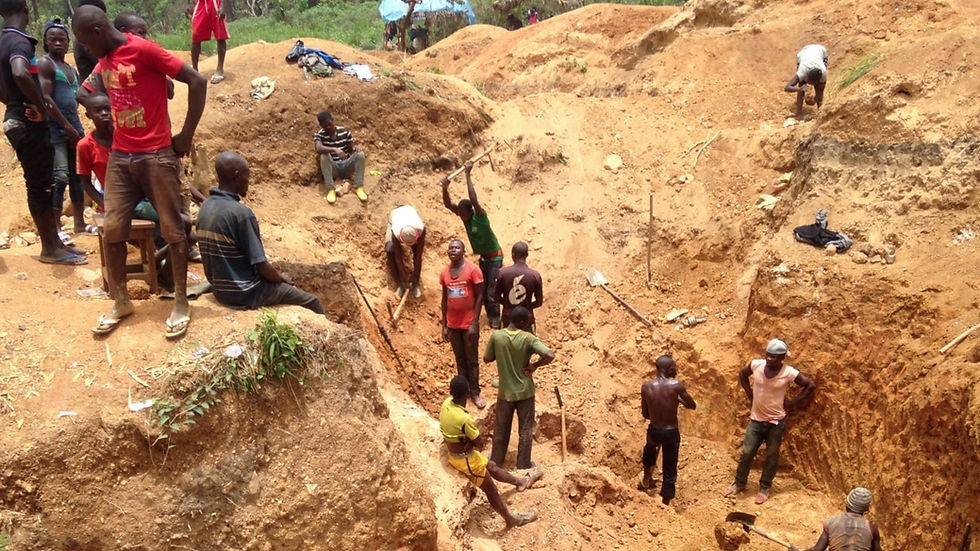Scholarships Success Stories from the Kasigau Corridor REDD+ Project in Kenya
- Jan 24, 2022
- 4 min read
Updated: 5 days ago
By Jane Okoth
If you wanted a glimpse into the Kenyan educational crisis in the early 90s, there is no better place to look than in the rural areas. During those times, there was unequal access to education, with less development in terms of infrastructure, with schools being few and understaffed. Thousands of students as old as ten did not have access to school because it was either not affordable for their guardians, or not made accessible for relevant stakeholders. Julius Mkala grew up in those times, in a small village called Kale in the southeastern part of rural Kenya.

Born in 1993, Julius was the 6th born in a family of 8. His parents did not have a reliable source of income and he and his siblings could regularly be found working at home when they should be at school. “My father was a farmer so educating us was already a burden,” he recalls. When the time came for Julius to join primary school, he was 5 years late. He was lucky because it was usual for children his age (or even older) to stay at home. “Some of my agemates didn’t even get a chance to join school. They were forced to help out at home with menial jobs, some forced to became herdsmen and unfortunately, a few girls were married young” he adds.
Julius completed his primary education and met the required threshold to join secondary school. Though he was supposed to celebrate this achievement, he had to live with the fact that it was a 50-50 chance that he would continue with his education, as he knew his father was unable to pay for his secondary school fees. It painfully reminded him of his two older brothers who, despite performing well in primary school, did not get a chance to proceed to high school.
Instead of starting his secondary education, Julius joined his brother who was running a kiosk in Maungu town and spent time helping his uncle who owned a butchery in the same town. “By this time, I did not have any hopes of joining secondary school, so I kept myself busy helping them and also doing odd menial jobs”.
Julius had also heard about Wildlife Works and Kelimu Trust sponsorship program, an organization headed by Alice Owen, which sponsored bright children from humble backgrounds throughout secondary education. “I had no idea about how it worked, but all it took was an interview at Wildlife Works offices to enable me to secure a sponsorship.” he recalls.
Wildlife Works and Kelimu Trust offered Julius a full scholarship for his secondary education at Kenyatta High School in Taita Taveta County for four years. His dream after completion of high school was to earn a place at Egerton University, his university of choice, and become an agricultural engineer. His hard work paid off and after four years, he scored a B at the Kenya Certificate of Secondary Education (KCSE). He was instead selected to join Moi University in Eldoret to pursue a Bachelor of Education in Early Childhood and Primary School. He had reservations about the course because a degree in education was not his choice of study. However, after talking to his parents and high school teachers, he joined Moi University in 2013 and instead switched to a Bachelor of Education in Guidance and Counselling. He hasn’t looked back since.
Now at 29 years of age, Julius is pursuing a Master’s in Education Management and Curriculum Studies at Mount Kenya University and hopes to attain his PhD by the time he is 40. He is also a teacher at Shomela Secondary School in Kilifi County and looking back, he says his journey to his profession would have not been easy were it not for the support of Wildlife Works. The school is in a remote area, and it sometimes reminds him of his school life growing up. Julius uses his opportunity as a teacher to shape the lives of future generations through sharing his life story with his students. “From my little savings, I have been helping my family and especially my sister who completed secondary education in this year,” he says.
“Having come from a situation where there was no hope for the future to where I am today is my biggest accomplishment,” he proudly states. His advice to everyone is to remain focused on one’s course. “Just like our Kenyan hero, Eliud Kipchoge said, “No human is limited.” We are not limited. We can all achieve what we desire with determination and hard work.”
With access to quality education being a challenge in rural parts of Kenya, the Kasigau Corridor REDD+ project in Kenya is meeting this Sustainable Development Goal by providing bursaries for bright yet vulnerable students as well as funding educational infrastructure.
The bursary program was implemented at the request of our community partners to address challenges when accessing education in the Kasigau REDD+ project.
Many students like Julius have been beneficiaries of the scholarship scheme which has put thousands of students through school. According to the Wildlife Works bursary report, more than KS 132 million shillings has been disbursed for over 25,800 bursaries in the Kasigau Corridor REDD+ project from 2012 to date. All these are students drawn from secondary school, college, tertiary, and university institutions.
Similarly, the Kenyan Government through the Ministry of Education has adopted a 100% transition policy to enroll all primary school leavers to secondary school in line with a global drive to increase literacy levels in the country.
Wildlife Works is proud to be creating successful development programs with our community partners. Congratulations Julius!



